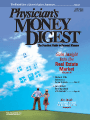Publication
Article
Physician's Money Digest
Insist on a Higher Wall Street Standard Steven Holt Abernathy
Author(s):
Over the past 10 years, professional ethics inthe United States have taken a pounding.We've heard about CEOs falsifying earningsreports, research analysts hyping stocks, andmajor accounting firms signing off on fraudulentincome statements and balance sheets. It's fair tosay that there are few professions inAmerica that remain unblemished.
The medical profession is one of thefew. Physicians have come through thisperiod relatively unscathed. Despite severalwell-publicized scandals, the publiccontinues to believe that doctors willbehave ethically and look out for theirpatients' interests. Medical professionalscontinue to set the standard for research,education, and ethical behavior.
FINANCIER'S OATH
What is it about the medical communitythat makes doctors less likely to yieldto unethical temptations? Unlike otherprofessionals, doctors make a public declarationto ethical behavior (ie, theHippocratic oath).What is interesting isthat the percentage of doctors who takethe oath has grown to almost 100%. In1928, only 24% of doctors took the oath.
The financial community should adopt theuse of their own professional oath, in which theypublicly commit themselves to provide adviceand services that will enable their clients to reachtheir financial goals. This public oath shoulddeclare their intention to manage their clients'assets in a responsible fashion, and in the manneragreed on between the advisor and the client.
Would such an oath accomplish anything? Insimilar rituals where people make a free andpublic commitment to certain behavior, the oathacts as a force that encourages the person tomaintain their commitment and helps preventthem from abandoning it. In addition,such an oath would mean that thefinancial community could no longercry "caveat emptor" when one of itsmembers uses their client's money tofurther their own interests.
RETURN TO ETHICS
In the medical community, the FDAand other organizations make the rightsand interests of patients their number-1priority. Perhaps another aspect of themedical community that should be adoptedby the financial community is strongeroversight by the government and otherregulatory agencies to protect the interestsof those served by the professional, andnot the professionals' interests.
Most of us cringe at the thought ofincreased government oversight, butunfortunately, in the financial community,government and regulatory organizationshave often been made into a cooperativeby the professionals themselves. Unless a verybig stick is used to punish financial communityscoundrels, the lucrative carrot that goes to thosewho break the rules will continue to promotebad behavior. Punishment will encourage companiesto nip unethical behavior in the bud,before it can impact a large number of investors.
Fortunately, it seems the new SEC CommissionerWilliam H. Donaldson has made toughenforcement a priority. And several successfulfinancial firms, such as Berkshire Hathaway,require their principals to have the vast majorityof their assets coinvested with their clients' assets.What they have placed in their clients' portfoliosis also in their own personal portfolios.
If all financial professionals coinvested withtheir clients in this fashion, it would move thefinancial community closer to a natural survival-of-the-fittest business model. The best financialprofessionals would succeed because, in additionto attracting more clients, their investment resultswould be superior. The worst financial professionalswould be out of business because they wouldlose both their own money and their clients.
In addition, financial professionals would nolonger be tempted to mismanage their clients' capitalto secure investment banking deals, since theywould then also be mismanaging their own money.If the financial community at large adopted thismodel, ethical problems would decrease whileinvestor returns would increase.
It might be true that Wall Street will never beas pure as the driven snow. As long as there ismoney to be made in exploiting people, therewill be someone there to do it. But the time hascome for financial professionals to acknowledgethat, like physicians, they are charged with a seriousduty. In taking a public oath, increasing governmentoversight, and coinvesting with theirclients, financial professionals would demonstratethat they no longer take this duty lightly.
Steven Holt Abernathy,
founder, principal, and
chairman of the Abernathy
Group, developed
a nationwide network of
medical and information
technology investors
who pool their expertise
to identify companies
with superior
products, technologies,
and management. He
welcomes questions or
comments at 800-292-6387 or info@abbygroup.com, or visit
www.abbygroup.com.
